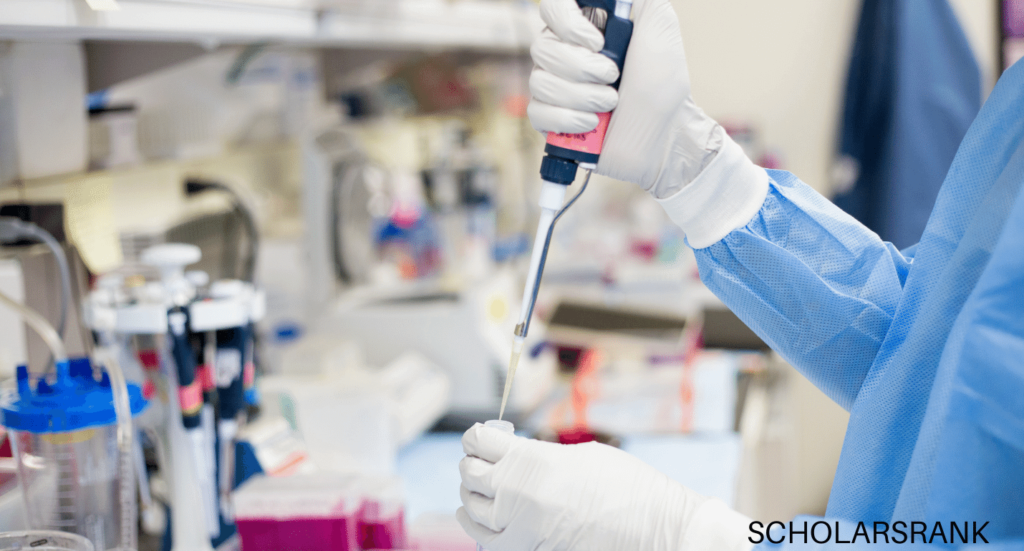Introduction
Is a biomedical science degree worth it? Everyone’s attention was focused on biomedical science in the early 2020s as a fearful world waited for a vaccine that could lessen the devastation caused by the COVID-19 epidemic. Fortunately, the extensive study conducted by biomedical researchers and experts from related sectors around the world resulted in the invention of various vaccinations that have been approved and given to more than 4.5 billion individuals.
Although the death rate has dramatically decreased and it is evident that the vaccines scientists tirelessly worked on for months have saved the lives of millions of people, many countries continue to battle with an increase in COVID cases.
Success in the challenging profession of biomedical science requires tenacity, creativity, and a tremendous deal of brainpower. For those who can enhance and save lives, the challenge is worthwhile.
Let’s examine more closely what makes up this cutting-edge profession and what you can do with a biomedical science degree to gain a better understanding of what exactly biomedical science is.
What Is Biomedical Science?

The research area known as biomedical science (biomedicine) focuses on the branches of chemistry and biology that are important to healthcare. There are three main areas of specialization in this extremely diverse field: physiological sciences, life sciences, and bioengineering. The majority of biomedical science careers focus on research and laboratory work for o advanced medical understanding.
This discipline’s breadth provides graduates with numerous alternatives to specialize well during their studies and, as a result, provides a wide range of job options. It is an extremely “real world” discipline. Biomedical researchers frequently receive media attention for their contributions to their fields, which produce visible results. A biomedical researcher might be creating a brand-new cancer therapy, IVF embryos, or 3D-printing a heart. The field of biomedicine is where chemistry, biology, and transforming the world come together.
The foundation of every healthcare professional’s knowledge is biomedical science. It is a comprehensive field of knowledge that encompasses all scientific research about biology as it relates to health care.
You will engage in a range of studies in a biomedical curriculum, including:
- Biochemistry
- Nutrition
- Kinesiology
- Microbiology
- Human anatomy and physiology
- Genetics
What Is A Biomedical Science Degree?
A university’s certification that a student has successfully finished an undergraduate program offering a wide education in biomedical science is known as a bachelor’s degree in biomedical science.
From there, undergraduates can either start looking for employment with their undergraduate degree or continue their studies by pursuing a specialty degree in a variety of disciplines. With a degree in biomedical sciences, you can pursue a wide range of careers, which we will discuss later.
A biomedical science undergraduate degree from an authorized university can educate you about a wide choice of careers and postgraduate study options.
What can you do if you major in biomedical science? The number of employees in nutrition science, medical research, and biomedical engineering is growing, and a bachelor of science in biomedical science can serve as a stepping stone to traditional medical schools.
Type Of Biomedical Science Degree Programme
Biomedical Science Bachelor’s Degree Programme
A biomedical science undergraduate program offers a wide variety of courses, making it a great option for those who aren’t sure where they want to specialize yet.
Numerous elective courses will be available to you as you complete your degree. Avoiding early specialization in your degree is a great idea because doing so will restrict your options. You can anticipate studying topics like (but not limited to):
- Physiology, pathology, and anatomy
- Cell biology and microbiology
- Pharmacology and toxicology
- Bioengineering
- Virology, bacteriology, immunology, and epidemiology
- Chemical biology and biochemistry
- Bioinformatics
- Genetics, phlebotomy, and embryology
A bachelor’s of science in biomedical sciences takes three years to complete on average (BSc). As an alternative, some universities provide four-year BSc (with “honors”) programs (Hons). Later on, it will be simpler to obtain a master’s or Ph.D. because of this.
Depending on your university, there may be different entry criteria for bachelor’s degree programs in biomedical science, but you can anticipate needing strong marks in math, biology, and chemistry.
Biomedical Science Master Degree Programme
Most biomedical science students select a specialization throughout their Master’s program, while a wide degree is still a possibility. Your postgraduate course preferences will probably coincide with your preferences for undergraduate courses. If you studied genetics in-depth for your Bachelor’s, for instance, choosing a Master’s program that significantly emphasizes genetics will be easier than if your past interests were elsewhere.
This is an excellent opportunity to consider wherever you want your career to go because the Master’s program you choose will have a big impact on it. In the same way, if you want to pursue a Ph.D., you must make sure that your MSc is relevant to the type of work you wish to conduct. Therefore, while choosing a Master’s program to apply to, keep a close eye on the coursework outlined in the curriculum.
Like undergrad courses, postgraduate courses are typically 1 or 2 two years long and combine classroom and lab instruction. To be eligible for an MSc, you typically need to have earned a strong final grade in your BSc degree.
Biomedical Science Phd. Degree Programme
A Ph.D. is what you should pursue if you desire to become an authority in your field of biomedical sciences. A biomedicine PhD typically requires a minimum duration of three years, in other STEM fields. Anything other than that then this is regarded as too little time to have made any important enough advancements to get a doctorate. Most Ph.D. programs take three to four years, although they might continue longer based on your research and the amount of funding that is available.
It is possible to transition directly from a BSc into a Ph.D. program, but you must have had excellent grades in your undergraduate degree. An interview is typically part of the Ph.D. application process, and references from your professors and/or advisors are required.
Ph.D. candidates will collaborate closely with a mentor who will help and mentor them as they complete their projects. A lot of study, experimentation, and data processing go into Ph.D. studies. If you successfully make a novel contribution to your scientific field before the completion of the Ph.D. program, you will be awarded the ‘Doctor’ title.
Reasons To Pursue A Career In Biomedical Science
There’s a lot of material to consider and a huge decision to make when selecting your course. The three main justifications for choosing to study biomedicine are as follows:
- It’s A Desirable Qualification
Many other professions require biomedical scientists, and the abilities they develop are frequently transferable.
- You Have The Power To Change The World
Biomedical scientists are at the edge of all medical advancements, disease cure research, and environmental studies!
- It’s Very Broad
The discipline of biomedicine is incredibly diversified. Before deciding on a course of study, students will have the opportunity to investigate a wide range of life science topics. However, avoid specializing too quickly in your study to avoid limiting your postgraduate and job prospects.
Alternatives To A Biomedical Science Degree
In addition to combining Medicine, Biology, and Chemistry, biomedicine also contains elements of numerous other disciplines. Depending on your preferences, you could prefer some of these:
| Life Sciences | Medicine | Bioinformatics | Biochemistry |
| Numerous colleges offer degrees in “Life Sciences,” which is sometimes a catch-all phrase for some Biology-related courses. Find something exciting in the curricula by looking through them. | If you wish to work closely with patients and aid in their recovery, think about studying this subject. You will become an MD by studying medicine (Medical Doctor). | Biology research frequently makes extensive use of data. The science of managing and analyzing large amounts of scientific data is known as bioinformatics. This is also known as “Life Science Informatics” at some universities. | For individuals who adore both chemistry and biology, there is biochemistry. The study of biological chemical reactions is known as biochemistry. |
Is A Biomedical Science Degree Worth It?
The depth of research comes first. No other degree integrates medical subjects like pathology, pharmacology, and immunology with basic science courses like microbiology, physiology, and chemistry. Some applications even let you create a personalized curriculum by selecting the particular classes you want to concentrate on.
Second, occupations in research and medicine, as well as professions that integrate both fields of study, are accessible to those with a bachelor’s degree in biomedical science. Jobs in biomedical science are generally easy to come by for recent graduates. Additionally, the pay for biomedical jobs might be very high.
In comparison to other industries, the growth of jobs in the healthcare sector is predicted to be substantially faster. A biomedical science degree is therefore a wise decision that may lead to a great future earning potential in biomedical science and job flexibility.
Career Options For A Biomedical Science Degree
Many positions demand a biomedical science degree or an equivalent before you may apply. Listed below are a few potential careers for biomedical scientists:
- Zoologist
You wouldn’t believe it, but a biomedical science degree can help you get ready for zoology coursework. The focus on basic biology, and also drug research, development of diagnostic techniques, naturally occurring antimicrobials, and other topics, apply to the rest of the animal kingdom as well, even though most people who study biomedical sciences go on to pursue careers related to human biology.
- Forensic Technologist
Forensic technologists must be knowledgeable in the examination of bodily fluids, DNA, hair, etc. to offer legal authorities objective testimony and evidence regarding crimes. Because there is such a wide variety of courses available in biomedical science, such as physiology, anatomy, and human genetics, you can study and practice forensic science with a biomedical science degree.
- Toxicology
In terms of scientific careers, toxicology may be the most varied. This is because toxicology integrates numerous academic disciplines, such as chemistry, biology, medicine, pharmacology, and nursing, to evaluate the safety and biological effects of medications, chemicals, agents, and other stimulants on living organisms, claims the American Chemical Society (ACS). While toxicologists with higher-level degrees may work in offices designing experiments and analyzing data, toxicologists with biomedical science undergraduate degrees can anticipate spending the majority of their time in laboratories.
- Dentistry
A bachelor of science degree can serve as a stepping stone towards other medical degrees, such as a doctor of dental medicine (DMD) or a doctor of dental surgery, aside from medical school (DDS). Some dental schools also have biomedical science departments where they conduct research and impart knowledge on topics ranging from the genetics of oral development to the engineering and regeneration of mouth tissue. A biomedical science bachelor’s degree can provide you with an advantage when it comes to learning the intricate details of dentistry.
- Pharmaceutical Sales
Pharmaceutical sales agents don’t just sell prescriptions; they also educate potential clients about the scientific aspects of various medications, how they work in the body, and how to successfully treat illness (usually physicians and nurse practitioners). In sum, pharmacists must comprehend the science underlying the medications they recommend. A profession in sales that has the potential to be financially rewarding requires a bachelor’s degree in biomedical science.
- Health Policy
Because it places a strong emphasis on comprehending the complexity of human health from a range of disciplines, including pathology, nutrition, and immunology, a degree in biomedical science is a perfect starting point for a doctoral degree in health policy. Those who hold a master’s degree in public health are qualified to make changes to health regulations at the municipal, state, and federal levels.
- Biomedical Researcher
The discipline of biomedical research is still expanding quickly. As a result, graduates in biomedical sciences have the option of finding employment at universities, labs, research hospitals, and other research organizations. A biomedical science degree’s diversified coursework enables you to focus on the areas of study that most interest you.
Biomedical Scientist Vs Clinical Scientist
Science careers can be rewarding and intriguing. A biomedical scientist and a clinical scientist are two positions that are frequently found in this industry. Despite some similarities, there are several significant variances between these jobs.
We talk about the distinctions between biomedical and clinical scientists.
| Biomedical Scientist | Clinical Scientist |
| Research is carried out by biomedical scientists to create novel illness treatments and cures. They create new medicines, diagnostic procedures, and medical gadgets using their understanding of biology and chemistry. Laboratories, hospitals, and research facilities are the workplaces of biomedical scientists. Other scientists, engineers, and medical experts, frequently collaborate in teams. A bachelor’s degree in a science-related subject, such as biology, chemistry, or biochemistry, is often required of biomedical scientists. Additionally, certain biomedical scientists may hold masters or doctoral degrees. | Clinical scientists are medical experts who design innovative diagnostic and therapeutic approaches and supervise their implementation in clinical settings. To make sure that the most recent medical innovations are effectively applied to enhance patient care, they work in hospitals, clinics, and private practices. Clinical scientists often hold a Ph.D. in a field of the life sciences, such as chemistry, physics, and biology, or a medical degree. They create new diagnostic procedures, assess the efficacy of novel therapies, and create methods for utilizing cutting-edge medical technologies using their scientific expertise. |
Biomedical Scientist Vs Clinical Scientist; Job Duties
Biomedical and Clinical scientists both conduct laboratory research, but their responsibilities are different. The key distinctions between a biomedical scientist and a clinical scientist are listed below.
| Biomedical Scientist | Clinical Scientist |
| Biomedical scientists run experiments to better understand biological mechanisms. They might investigate how genes impact health, create novel medical procedures, or look for illness indicators in bodily fluids. | Clinical scientists work with people who are ill or have ailments. Their responsibility is to assist these people by conducting diagnostic procedures and other medical treatments. These experts might take blood samples from patients or perform tests on already taken samples. After that, they make treatment plans based on the findings. |
Conclusion
Is a biomedical science degree worth it?
One of the top healthcare certifications you can earn is in biomedical science! You have the rare chance to explore multiple scientific disciplines in an undergraduate biomedical science degree without having to choose a professional route until you know what you enjoy most.
Your biomedical science degree can open doors to employment in a variety of occupations, including teaching, medical practice, sales, research, and hospital and institutional work. To become a dentist, podiatrist, medical doctor, etc., students can also use this degree to continue their graduate studies in the health sciences.
Additionally, this degree equips you for the first-professional programs at National University where you can pursue the programs to become an acupuncturist or oriental medicine practitioner or study to become a chiropractor or naturopathic physician.
Frequently Asked Questions (FAQs)
Is A Degree In Biomedical Science Difficult?
- Intense coursework like biomedical sciences will cause you to burn out if you don’t take breaks from studying. 2 hours of fruitful study are considerably more beneficial than four hours of mediocre effort. Your business will suffer if you don’t take care of yourself.
What Guidance Would You Provide For A Student Studying Biomedical Science?
- Improve your lab abilities! Your biomedical career will greatly benefit from developing your confidence and skill at fundamental laboratory procedures like micro-pipetting, titrations, creating microscope slides, balancing a centrifuge, etc. Laboratories will favor applicants with great lab abilities when you apply for jobs, especially early in your career. You can be trusted to complete jobs, which saves them both time and money. All branches of research would benefit greatly from the experience and transferable abilities in laboratory work.
You can also read, “Is An Accounting Degree Worth It In 2023?“








